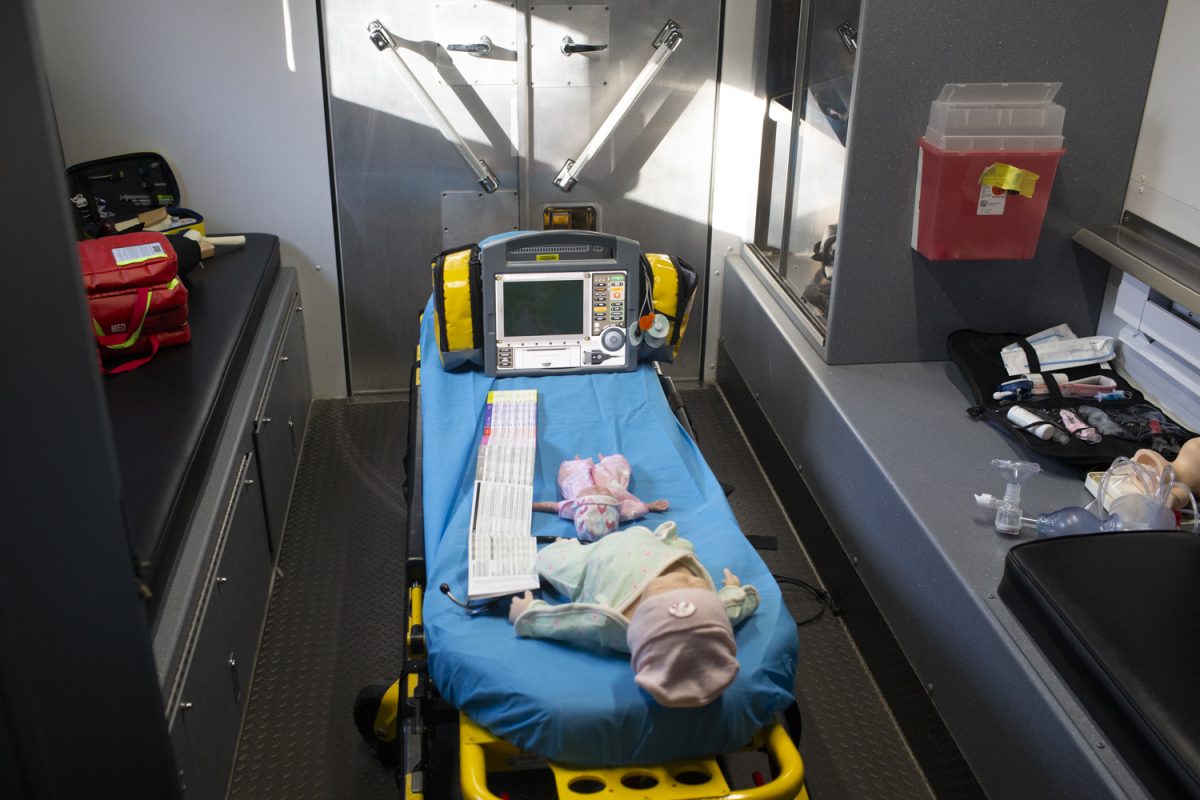It is no secret that thousands, if not millions, of programs worldwide moved online during the coronavirus pandemic, causing issues for health care workers, in particular. These are issues the minds behind Simulation in Motion – Iowa, or SIM-IA, have recognized and created a program to help combat.
SIM-IA is a mobile training program that brings high-quality clinical training to health care professionals across the state. The program is currently home to three trucks located in Sioux City, Des Moines, and Swisher and is in its third year of operation.
The Swisher-based truck was on-site at the University of Iowa College of Nursing Homecoming Tailgate Friday afternoon, offering tours and demonstrations.
“We want to reach out, and we want to be able to touch anybody that has any sort of patient care contact whatsoever,” SIM-IA Program Director Brian Rechkemmer said. “One of our biggest goals is we want to improve patient outcomes across the state of Iowa.”
Rechkemmer said the program has trained over 9,000 people in 500 different locations. 97 percent of participants reported feeling an increase in their clinical confidence, and 99 percent found the simulations valuable to their practice.
SIM-IA acquired its first truck in July 2022, Rechkemmer said, after receiving an $8 million grant from the Leona M. and Harry B. Helmsley Charitable Trust, covering the cost of the trucks, equipment, and first four years of training services, which are offered free to all EMS providers and critical access hospitals.
Only three other states — South Dakota, North Dakota, and Montana — have similar mobile simulation centers.
Rechkemmer said the program brings training right to people’s front doors, which is a huge benefit coming out of COVID-19, as many people did medical training online and lacked the hands-on skills needed for their profession. Being able to bring the training directly to teams eliminates any possible disconnection of information.
“If they send the provider to go do the training, they go do the training, and then they come back, and they are expected to do the training for the rest of the department,” Rechkemmer said. “That can be difficult starting the old telephone game. Every time it gets told again, it gets told differently.”
Cormac O’Sullivan, SIM-IA senior advisor and one of the people who helped create the program, was offering tours to attendees at the College of Nursing Homecoming tailgate on Friday.
“A lot of the rural hospitals do not have any funding whatsoever to try and educate people,” O’Sullivan said. “When we were talking to them when we were doing the needs assessment, they just didn’t have the money.”
O’Sullivan said many of their trainings are centered around low-frequency, high-risk situations that rural providers do not often see. In one scenario, they simulated a mother hemorrhaging after childbirth, and the crew dealt with that same case in a real scenario later that same evening.
RELATED: Rural telepsychology program spanning across Iowa – The Daily Iowan
“Some of the situations that occur, a person who does an entire career in health care might see it once,” he said.
Despite the funding challenges, the program has reached every county and worked with every hospital and EMS system in Iowa. The goal is to continue standardizing care, improving care, and benefiting the people of Iowa, but the program needs to secure new funding sources to do so, as the initial grant runs out in June.
Terry Wicks, who received his Doctor of Nursing Practice from UI in 2018, is now a faculty member at the University of North Carolina-Greensboro but returned to Iowa City for UI’s homecoming. During his time at UI, O’Sullivan was in the process of applying for the initial grant, but Wicks had never been inside of the truck previously.
As faculty at UNC-Greensboro, he shared that the mannequins in the truck perform many of the same functions as the ones his students work with in their simulation lab.
“It helps train providers to be able to respond appropriately with the right algorithm to manage the situation,” he said.
Wicks’ mother lives in the rural community of Guttenberg, Iowa, which, in the best of circumstances, is an hour away from the nearest medical center in Dubuque. Wicks said he appreciates the training the program brings to rural health care areas such as Guttenberg.
“Those people are not going to see those kinds of events — maybe once or twice a decade. So, for them to be able to see and participate in simulation and be evaluated, to score their own performance and improve, that’s critically important,” Wicks said.



